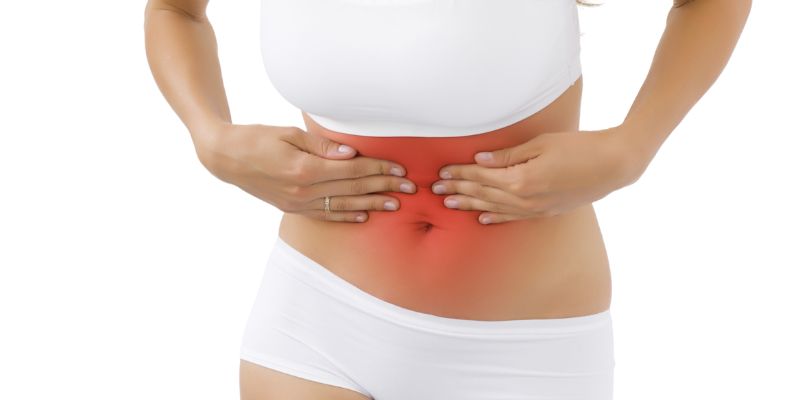Upper Abdominal Pain
Oct 05, 2023 By Madison Evans
Do you experience frequent upper abdominal pain that won't go away no matter what you do? If so, you may be dealing with an underlying condition or health issue. Read on to understand more about the various causes of this common symptom and how to find relief!
In this article, we will discuss some of the most common explanations for why upper abdominal pain occurs and the steps you can take to get lasting relief. We will also offer helpful tips on when it is important to seek medical attention from a doctor to ensure your safety.
With the right information and actionable advice, you can become better informed about your situation and comforted, knowing that the strategies available could provide much-needed relief.
What is Abdominal Pain
Feeling uncomfortable or pain felt between the chest and the pelvis, often known as the abdomen, is referred to as abdominal pain. It is a typical symptom that might range from mild, passing, to severe and enduring.
Symptoms related to Abdominal Pain

Abdominal pain can be accompanied by additional symptoms, depending on the underlying cause. These symptoms can help healthcare professionals in diagnosing the condition.
Here are some common symptoms that may occur along with abdominal pain:
Nausea and vomiting
Many conditions that cause abdominal pain can also lead to feelings of nausea and may result in vomiting. This can be seen in conditions such as gastritis, gastroenteritis, appendicitis, gallstones, kidney stones, and gastrointestinal infections.
Diarrhea or constipation
Abdominal pain can be associated with changes in bowel habits. Some individuals may experience diarrhea, characterized by loose and frequent bowel movements, while others may have constipation, which involves difficulty passing stools or infrequent bowel movements.
Conditions like irritable bowel syndrome (IBS), inflammatory bowel disease (IBD), and gastrointestinal infections can cause these bowel changes.
Bloating and gas
Abdominal pain may be accompanied by a sensation of bloating and increased gas production. This can occur in conditions such as indigestion, IBS, and certain food intolerances.
Fever
Infections like urinary tract infections, appendicitis, or gastrointestinal infections can lead to abdominal pain and fever. A fever may indicate an underlying infection that requires medical attention.
Loss of appetite
Some individuals may experience a decreased desire to eat or a loss of appetite when experiencing abdominal pain. This can be due to gastritis, gastroenteritis, or other gastrointestinal issues.
Fatigue
Abdominal pain, especially when chronic or severe, can lead to feelings of fatigue and weakness. This can result from the body's response to pain, inflammation, or associated symptoms like vomiting and poor appetite.
Changes in urine
In cases involving the urinary tract, such as kidney stones or infections, additional symptoms may include changes in urine color, increased urination urgency, pain or burning during urination, or blood in the urine.
Abnormal bleeding
Some conditions, such as gastrointestinal ulcers or gynecological issues like ovarian cysts or endometriosis, can cause abdominal pain accompanied by abnormal bleeding, including rectal or abnormal vaginal bleeding.
Causes Of Abdominal pain

Abdominal pain can have various causes, ranging from mild and self-limiting to more serious medical conditions.
Some common causes of abdominal pain include:
Gastrointestinal Issues
- Indigestion or dyspepsia
- Gastritis
- Gastroenteritis (stomach flu)
- Peptic ulcers
- Irritable bowel syndrome (IBS)
- Inflammatory bowel disease (IBD) like Crohn's disease or ulcerative colitis
- Gastroesophageal reflux disease (GERD)
- Gallstones
- Pancreatitis
Appendicitis
Inflammation of the appendix, which is located in the lower right abdomen.
Kidney Stones
Hard mineral and salt deposits form in the kidneys and can cause pain when they obstruct the urinary tract.
Urinary Tract Infections (UTIs)
Infections in the urinary system, including the bladder or kidneys.
Gynecological Conditions
- Ovarian cysts
- Endometriosis
- Pelvic inflammatory disease (PID)
- Menstrual cramps (dysmenorrhea)
Hernias
When an organ or tissue protrudes through a weak spot in the abdominal muscles.
Diverticulitis
Inflammation or infection of small pouches that form in the colon's lining.
Gallbladder Issues
Inflammation or blockage of the gallbladder, such as cholecystitis or biliary colic.
Liver Disease
Conditions that affect the liver, such as hepatitis or liver abscess.
Intestinal Obstruction
Blockage in the intestines can cause severe abdominal pain.
Abdominal Aortic Aneurysm
A bulge or rupture in the large blood vessel that supplies blood to the abdomen causes severe abdominal pain.
Infections
Infections affect various abdomen organs, such as peritonitis (inflammation of the abdominal lining) or abscesses.
Other Causes
- Muscle strain or injury
- Stress or anxiety
- Medication side effects
- Food poisoning or food allergies
- Psychological factors like somatization disorder or functional abdominal pain
Treatment for Abdominal Pain
The treatment for abdominal pain depends on the underlying cause of the pain. Since there are numerous potential causes, treatment approaches may vary.
Here are some general strategies and interventions that may be used to manage abdominal pain:
Medications
- Over-the-counter pain relievers like acetaminophen or nonsteroidal anti-inflammatory drugs (NSAIDs) may temporarily relieve mild abdominal pain.
- Antacids or acid reducers may be used for indigestion or gastritis.
- Proton pump inhibitors (PPIs) or H2 blockers can help reduce stomach acid production in cases of GERD or ulcers.
- Antibiotics may be prescribed to treat bacterial infections, such as in cases of appendicitis or certain gastrointestinal infections.
- Medications targeting specific conditions like IBS, IBD, or menstrual cramps may be prescribed.
Lifestyle and Dietary Changes
- Avoiding trigger foods or substances that worsen abdominal pain, such as spicy foods, alcohol, or caffeine.
- Eating smaller, more frequent meals to prevent overeating and improve digestion.
- Increasing fiber intake and staying hydrated promote healthy bowel movements and prevent constipation.
- Managing stress through relaxation techniques, exercise, or therapy, as stress can exacerbate abdominal pain in some individuals.
Antibiotic Therapy
- Antibiotics may be prescribed to target the underlying infection in bacterial infections, such as urinary tract infections or abdominal abscesses.
Surgical Intervention
- Some conditions causing abdominal pain, such as appendicitis, gallstones, or certain hernias, may require surgical intervention to alleviate or remove the affected organ or tissue.
Management of Underlying Conditions
- Treating underlying conditions like IBD, endometriosis, or kidney stones may involve a combination of medications, lifestyle changes, and surgical interventions.
It's important to consult with a healthcare professional for a proper diagnosis and treatment plan tailored to your specific condition. The treatment approach will depend on the abdominal pain's severity, duration, and underlying cause.
In some cases, further, diagnostic tests or imaging studies may be necessary to identify the cause accurately. Prompt medical attention is advised if the pain is severe, persistent, or accompanied by additional concerning symptoms.
FAQs
What does upper gastric pain feel like?
Upper abdominal pain can vary significantly in intensity and type. It may be a dull ache, sharp stabbing sensation, burning, or feeling of fullness. It could also be accompanied by nausea, vomiting, indigestion, or bloating.
What are the 3 types of abdominal pain?
The three most common types of abdominal pain are cramping, dull (or achy), and sharp. Cramping is usually associated with menstrual cycles in women and can be mild or severe. Dull abdominal pain is often chronic, lasting more than a few days to weeks without change. Sharp pain is sudden and intense, occurring suddenly and subsiding quickly.
How can I relieve upper abdominal pain?
Generally, upper abdominal pain can be relieved with self-care measures such as over-the-counter antacids, rest, and relaxation techniques. If the pain persists, consult a healthcare professional for further evaluation and treatment.
Conclusion
Upper abdominal pain is a common symptom that a range of underlying medical conditions can cause. It is important to understand the possible causes and take the necessary steps to find relief from your discomfort.
However, if you experience persistent abdominal pain symptoms, it would be best to consult a doctor or health care provider immediately to get an accurate diagnosis and proper treatment. Thanks for reading Upper Abdominal Pain - now it's time to take action!







